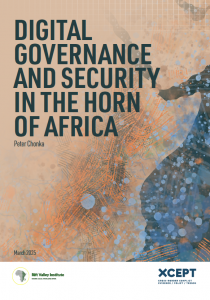While digital finance—including mobile money—has developed unevenly across Somalia, Ethiopia and Kenya, such technologies are nevertheless transforming everyday economic activities. In some cases, borderlands and cross-border financial flows are central to these digital developments and are driving further innovation. From the perspective of states affected by institutional weakness and/or security threats, digital financial technologies represent a ‘double-edged sword’. On one hand, having new ways of transferring financial resources within and across borders gives conflict actors the opportunity to evade state scrutiny and controls. On the other hand, digital finance leaves data trails that can potentially be utilized for governance, accountability, security and revenue-generation purposes.
Summary
- Social media similarly presents both pros and cons for governance. Although such platforms enhance connectivity, they also fuel polarization and amplify misinformation and disinformation, particularly via non-state actors, diaspora networks and local social media influencers seeking engagement by spreading harmful content.
- In different ways, the Somali, Ethiopian and Kenyan and telecoms sectors have become increasingly embedded in financial flows, making them central to governance across the region.
- On paper, the regulation of digital finance and data security is increasing. In practice, however, the wider institutional, political and security landscape creates significant gaps in the development and enforcement of relevant legislation—whether at the centre or in borderland settings.
- It is often already marginalized populations in borderland and/or conflict-affected settings who suffer the most from intentional or unintentional disruptions of network connectivity. Having to rely on digital finance in contexts where physical cash may not be accessible adds another layer of vulnerability to those affected by conflict and displacement.
- Digital finance and connectivity through social media are becoming increasingly intertwined, for instance through the use of different digital platforms to solicit and source new types of finance (e.g. encrypted messaging and cross-border cryptocurrency flows).
- Overall, it is unclear whether the increased emphasis on digital finance governance within wider counter-terrorism efforts in the Somali context is having a tangible impact on the diverse revenue-generation tactics and technologies of armed groups such as al-Shabaab.
- State authorities in the Horn of Africa have different levels of engagement and contact with external social media platforms. While large amounts of content created within the region is being ‘moderated’ and removed from platforms, it remains unclear whether automated content moderation for conflict-related material is effective. At the same time, human-led content moderation remains difficult and under-resourced.
XCEPT PROGRAMME
This report is a product of the Cross-Border Conflict Evidence, Policy and Trends (XCEPT) research programme. XCEPT brings together leading local and international experts to examine conflict-affected borderlands, how conflicts connect across borders, and the factors that shape violent and peaceful behaviour. The programme carries out research to better understand the causes and impacts of conflict in border areas and their international dimensions. Funded by UK International Development, XCEPT offers actionable research to inform policies and programmes that support peace, and builds the skills of local partners. The views expressed do not necessarily reflect the UK government’s official policies.




